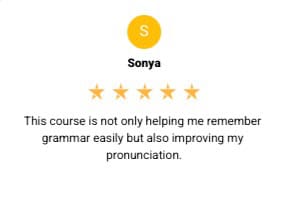👇 Take this lesson with you! 👇
If you feel like you are not making progress with your spoken English, then read on because this article is going to help you improve your speaking skills for IELTS.
I am going to give you 5 simple tips you can do everyday that will improve your English speaking, and will help you to get ‘unstuck’ and to do really well in your IELTS Speaking test
Table of Contents
Learn Speaking by Listening
Learn speaking by listening
Did you know humans have been speaking for much longer than we have been writing?
Speaking came first.
We began speaking more than 10,000 years ago, but we only first began writing in around 3000 BC with Egyptian hieroglyphics and Sumerian Cuneiforms.
Writing and grammar was actually a way to capture what we say.
However, it wasn’t perfect and writing became and is, a different system from speaking.

So, it makes sense that we should learn to speak by listening to people speak, not by reading words.
Yet so many people try to learn to speak through reading books often reading aloud. We can see this in classrooms around the world, mainly because it is easy and possibly because in the past many teachers teaching a foreign language did not have access to native speaker voices or audio.
But the world has changed!
You can find native speaker voices anywhere on the Internet.
So I propose you should learn to speak by listening.
The benefits are:
- You learn natural English
- You know it’s spoken language
- You learn pronunciation
- You get context
Sure the books can help, but just have the ‘written word’ as a support
We are surrounded by spoken language!
Use it to learn how to speak.
Repeat and Juggle
A great way to automate your vocabulary (that means you can use it automatically without thinking) is to follow this simple 3-step method:
- Listen
- Repeat
- Juggle
So, for example, you hear this phrase ,
I love Paris
you then repeat it.
After that, you repeat it but changing one word. Do this several times, changing for a new word each time. So you might say,
I love London, I love Hanoi, I love New Delhi
Finally to juggle, is to change the tense. So instead of using the present tense, you might use the past simple, future or other tenses.
So you might say,
I love Paris
I loved Paris
I will love Paris
I used to love Paris
I would love Paris, if….
If you like, you can complete the sentence, so it makes more sense.
For example,
I love Paris
I loved Paris when I was there last year.
I will love Paris when I go there next month
I used to love Paris when I lived there years ago.
I would love Paris, if could go there!
A great tool to practice repeating words from an audio or video is the Woodpecker mobile app.
This is an app that gives you access to lots of videos and you can use the timestamp in the transcript to effortlessly playback phrases so you can practice repeating.

Focus on Chunks
One of the best ways to increase your fluency is to focus on chunks.
What is a chunk?
A chunk is simply a piece of language. So, maybe 2 to 4 words that are usually spoken together as one sound.
Chunks appear almost everywhere in spoken English. For example, chunk s can appear as,
- Collocations – heavy rain
- Idiomatic expressions – kick the bucket
- Fillers – on top of that
Check out this great tool for Collocations
When you learn individual words you have to think about putting each one together.
When you learn chunks, you no longer have to think about putting each word in place, you focus on putting the chunks in place.
This is easier, increases your fluency and will probably produce more accurate language.
Imagine building a wall brick by brick. It can be very slow. Now imagine you could build the wall, layer by layer, each layer having chunks of 3 or 4 bricks.
It is going to be faster and you will actually get a straighter better wall!
So instead of learning just individual words, focus on learning and practicing chunks.

Push Your Comfort Zone
When studying we like to have a safe environment where we feel comfortable and happy studying, and that is a good thing.
At the same time, when you do the IELTS Speaking Test, it’s with a real person that you don’t know. You will feel uncomfortable. You will be nervous, and afraid of making mistakes.
So, it is really important that when you prepare for IELTS Speaking, you get used to feeling uncomfortable.
How can you do that?
Simple, just push your comfort zone.
Do some IELTS Speaking practice where you feel uncomfortable, such as joining a class, finding a speaking partner on line, engaging with others, even just posting a comment on a forum. Whatever it is, just start engaging with others and practicing your English with others.
After all, speaking English is all about communicating with others.
So push your comfort zone and you will see yourself slowly building your confidence as you speak.
Immerse Yourself in Natural English
Studying with a teacher is good, and reading course books for English students can be useful. This gives you a limited amount of language to learn step by step. The teacher will speak slowly and help you understand, correct your mistakes and be polite.
However, people in the real world usually don’t speak like teachers.
They speak quickly, expect you to understand and respond quickly too.
So it is essential that as well as learning from materials designed for English students, that you also learn from the real world.
You need to immerse yourself in natural English, so you can communicate effectively in the real world and in the IELTS Speaking Test.
There are lots of opportunities for language immersion.
- Videos /podcasts
- News broadcasts
- Current affairs
- Chat shows
- TED talks
- Films
Choose things you enjoy and find useful. At times, choose things that you wouldn’t usually choose, to expose you to new language and new topics. This will help you build confidence to talk on a wide range of topics (as required by the IELTS Speaking Band Descriptors) not just your favourite ones!
How do you improve your listening skills?
Share your tips and ideas in the comments below and then as a community we can all learn and improve together!






21 thoughts on “5 Smart Ways to Improve your Speaking Skills for IELTS”
Pingback: Digital Curation on Oral Genres (Resources to Learn) | Pearltrees
thanks for sharing, it’s really helpful ^^
My pleasure!
Engrossed !Where to find more chunks related words ?
You can find lots of new vocabulary in my live lessons – https://keithspeakingacademy.com/ielts-speaking-free-live-lessons/
Very interesting, thanks for sharing !
My pleasure!
Thank you teacher for your effusive essay you made my day indeed. reading your essay, i can say my spirit lifted dramatically.
You and Yours
🙌🙌🙌
Pleased to hear that and glad you liked it!
So pleased to hear that – thanks for reading.
You’re great, Keith.
Thank you so much!
Pingback: 5 Smart Ways to Improve your Speaking Skills - Learn English and Science Online
Hi teacher I’ve been following you for one month, you are a mazing. I feel I am going to push the comfort zone.
This is the best channel at all. Keep going👍👍
So pleased to hear that and good luck pushing that comfort zone!
To increase my listening skill , I watch movies , listen podcast and try to learn chunks.
That’s great – those are good methods. What podcasts do you like to listen to?
Dear Keith, its a nice and useful video.
Thanks – glad you like it!
Hi Keith thank you for your ever supported review and giving tips for elts Speaking
My pleasure – I am glad it can help!